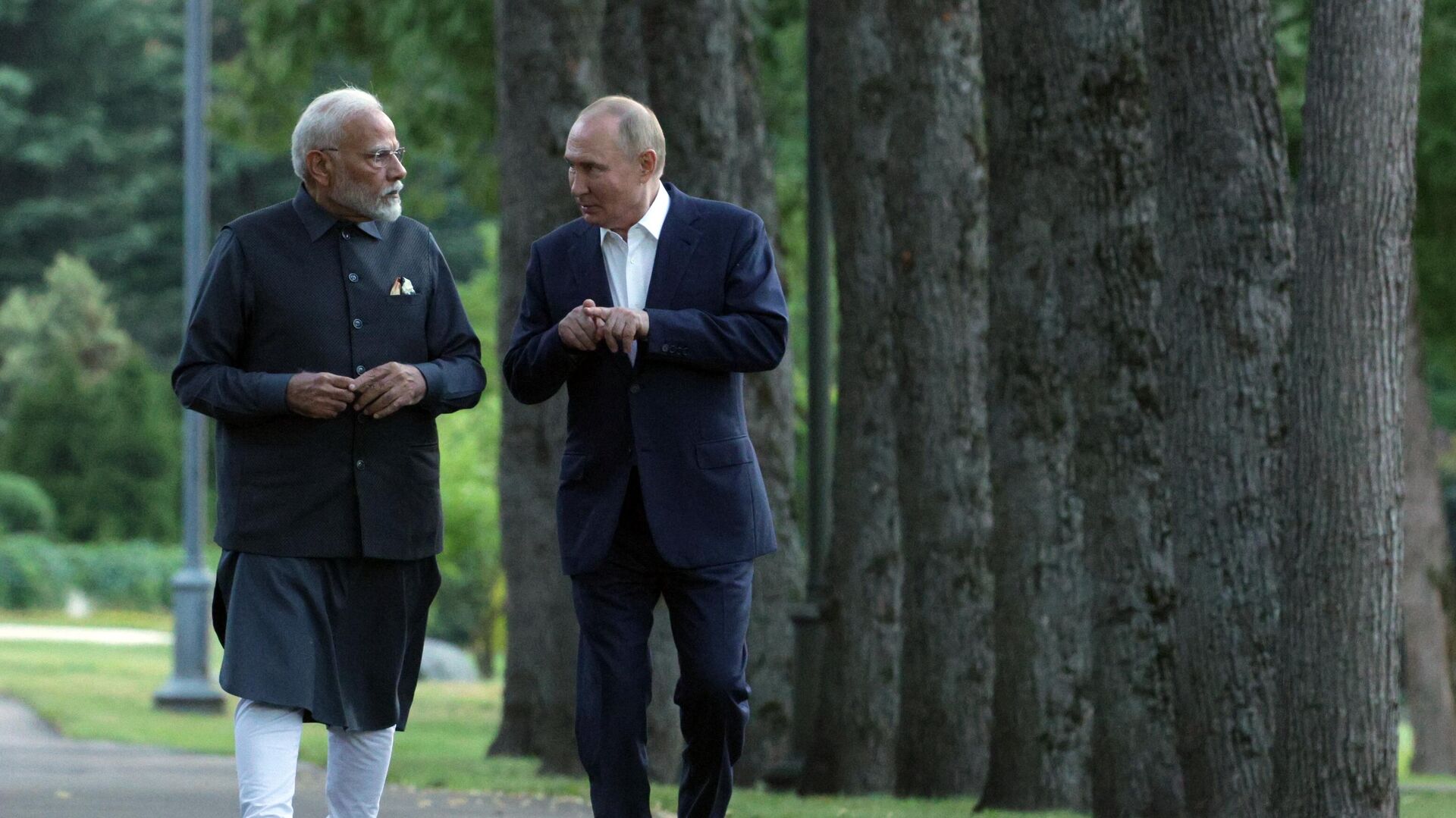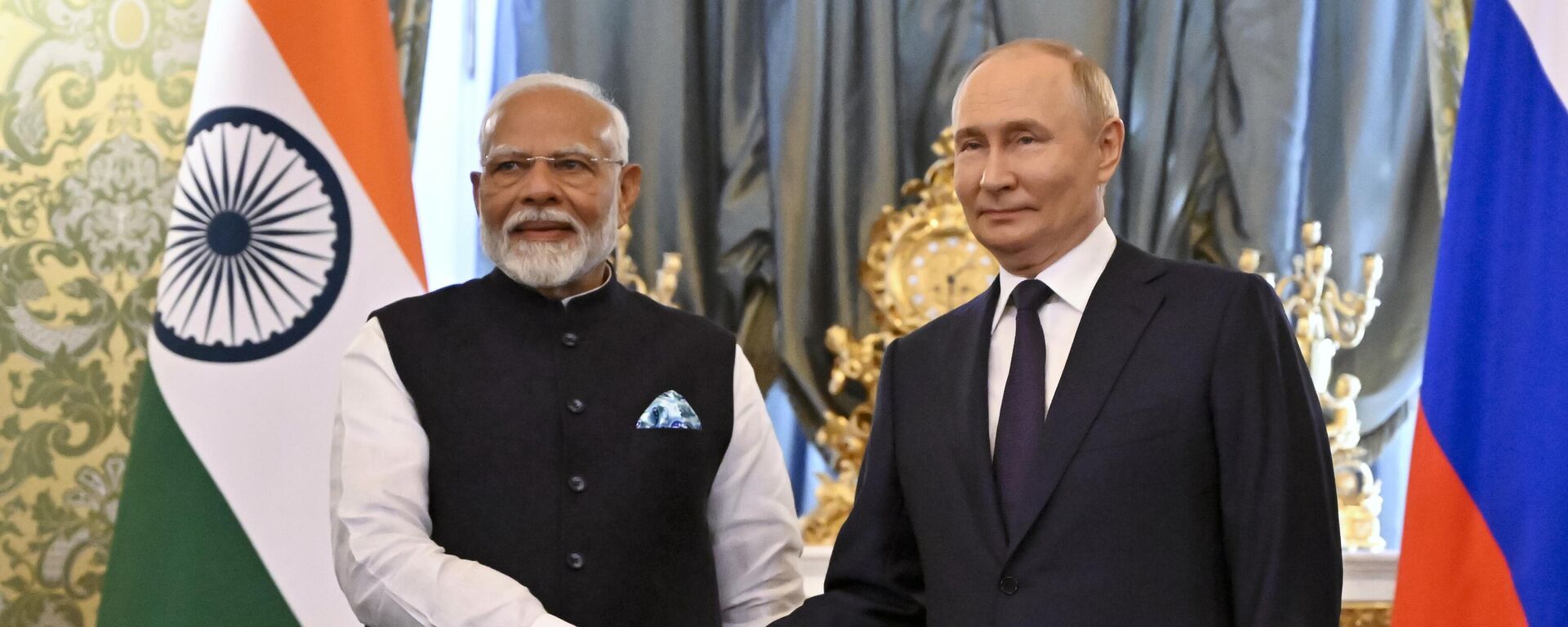https://sputniknews.in/20240709/terrorist-proxies-working-to-destabilize-russia--india-in-eurasia-7813525.html
Terrorist Proxies Working to Destabilize Russia & India in Eurasia
Terrorist Proxies Working to Destabilize Russia & India in Eurasia
Sputnik India
With proxy terrorist actors working in tandem to weaken and destabilize India and Russia, the two strategic partners will expand and strengthen their cooperation on terrorism, a geopolitical pundit has said.
2024-07-09T20:43+0530
2024-07-09T20:43+0530
2024-07-09T22:23+0530
sputnik opinion
narendra modi
vladimir putin
india
russia
moscow
national investigation agency (nia)
daesh (isis/is/islamic state)
delhi
new delhi
https://cdn1.img.sputniknews.in/img/07e8/07/09/7814306_0:0:3109:1748_1920x0_80_0_0_00faf1ec2007d2176f2f41727537faa9.jpg
India and Russia will expand and strengthen their cooperation on terrorism, while proxy terrorist actors working in tandem to weaken and destabilize the two strategic partners, a geopolitical pundit has said.The recent geopolitical scenario has made counter-terrorism cooperation between India and Russia immensely important and that is why ties between the two nations are going to strengthen in this domain, according to Abhinav Pandya, a founder and CEO of the Usanas Foundation, foreign policy and national security think tank.In March this year, one of the bloodiest terrorist strikes in the history of Russia left over 140 dead, when gunmen opened fire inside the Crocus Concert Hall in the region of Moscow.Links between Terrorists Attacking India and RussiaPandya highlighted that Islamic extremism, jihadi terrorism has been India's critical security challenge for the last 4-5 decades, and ISKP poses a grave threat to the state's security – both at the internal and external levels.The think tanker reckoned that ISKP has ties with Lashkar-e-Taiba*, as one of the former commanders of the jihadist organisation was a Pakistan-based militant group's cadre.He mentioned that in recent years, several radicalized youths from Kerala, Maharashtra, Hyderabad, and Uttar Pradesh joined ISKP in Afghanistan.More than 25 ISKP modules and several recruiters have been busted and arrested by the Indian National Investigation Agency (NIA) in the country's hinterland.Pandya stated that another major threat to India is Al Qaeda in the Indian Subcontinent (AQIS*).Besides, the spread and strengthening of ISKP in Central Asia and the South Caucasus is a prime security and safety concern for India as these areas form its neighborhood, he stressed.Moreover, the named terror groups can threaten several connectivity projects like the International North-South Transport Corridor (INSTC) of which India and Russia are key stakeholders.Global Powers Supporting Jihadists as Proxies to Weaken Their RivalsIn addition to that, India and Russia both agree that one cannot have double standards on terrorism, which was underlined during the SCO Summit in Astana last week. There are no good or bad terrorists as some countries believe, Pandya highlighted.He added taht there are attempts to support ISKP in Central Asia and South Caucasus by powerful state actors who see Russia as a geopolitical rival. Thus, they are aiming to destabilize the Russian neighborhood and weaken the country, Pandya summed up.Modi Pained With Terror Incidents in RussiaNotably, his remarks follow Indian Prime Minister's condemn of terrorism-related incidents during his talks with Russian President in Moscow.* banned in Russia, India and other countries
https://sputniknews.in/20240709/india-highlighted-as-russias-most-important-strategic-investment-partner-7812130.html
india
russia
moscow
delhi
new delhi
south asia
eurasia
Sputnik India
feedback.hindi@sputniknews.com
+74956456601
MIA „Rossiya Segodnya“
2024
Pawan Atri
https://cdn1.img.sputniknews.in/img/07e6/0c/13/139630_147:0:831:684_100x100_80_0_0_8fa2b25903e7787fe6a2698552c167df.png
Pawan Atri
https://cdn1.img.sputniknews.in/img/07e6/0c/13/139630_147:0:831:684_100x100_80_0_0_8fa2b25903e7787fe6a2698552c167df.png
News
en_IN
Sputnik India
feedback.hindi@sputniknews.com
+74956456601
MIA „Rossiya Segodnya“
Sputnik India
feedback.hindi@sputniknews.com
+74956456601
MIA „Rossiya Segodnya“
Pawan Atri
https://cdn1.img.sputniknews.in/img/07e6/0c/13/139630_147:0:831:684_100x100_80_0_0_8fa2b25903e7787fe6a2698552c167df.png
modi-putin meeting, modi putin summit, russia india annual summit, modi moscow visit, modi russia visit, russia india ties, russia india trade, modi putin informal talks, us interference in india, nato summit in washington, putin dacha, putin presidential home, russia ukraine conflict, modi terrorism russia, modi terror incidents russia, modi putin terrorism, modi putin terrorism talks,
modi-putin meeting, modi putin summit, russia india annual summit, modi moscow visit, modi russia visit, russia india ties, russia india trade, modi putin informal talks, us interference in india, nato summit in washington, putin dacha, putin presidential home, russia ukraine conflict, modi terrorism russia, modi terror incidents russia, modi putin terrorism, modi putin terrorism talks,
Terrorist Proxies Working to Destabilize Russia & India in Eurasia
20:43 09.07.2024 (Updated: 22:23 09.07.2024) For years, India and Russia have faced the worst of terrorism, with proxy terrorist actors often blamed for their attempts to destabilize the two nations. On Tuesday, Indian Prime Minister Narendra Modi shared his pain over terrorism incidents with President Vladimir Putin.
India and Russia will expand and strengthen their cooperation on terrorism, while proxy terrorist actors working in tandem to weaken and destabilize the two strategic partners, a geopolitical pundit has said.
The recent geopolitical scenario has made counter-terrorism cooperation between India and Russia immensely important and that is why ties between the two nations are going
to strengthen in this domain, according to
Abhinav Pandya, a founder and CEO of the
Usanas Foundation, foreign policy and national security think tank.
"Both India and Russia are facing challenges from radical Islamism. For example, the attack on a theatre in the Crocus region of Moscow was carried out by the Islamic State Khorasan Province (ISKP)*," he noted.
In March this year, one of the bloodiest terrorist strikes in the history of Russia left over 140 dead, when gunmen opened fire inside the Crocus Concert Hall in the region of Moscow.
Links between Terrorists Attacking India and Russia
Pandya highlighted that Islamic extremism, jihadi terrorism has been India's critical security challenge for the last 4-5 decades, and ISKP poses a grave threat to the state's security – both at the internal and external levels.
The
think tanker reckoned that ISKP has ties with
Lashkar-e-Taiba*, as one of the former commanders of the jihadist organisation was a Pakistan-based militant group's cadre.
He mentioned that in recent years, several radicalized youths from Kerala, Maharashtra, Hyderabad, and Uttar Pradesh joined ISKP in Afghanistan.
More than 25 ISKP modules and several recruiters have been busted and arrested by the Indian National Investigation Agency (NIA) in the country's hinterland.
Pandya stated that another major threat to India is Al Qaeda in the Indian Subcontinent (AQIS*).
"Increasing radicalization and communal polarisation also give fertile ground to terrorist groups like the ISKP and AQIS in India," the author of 'Radicalisation in India: An Exploration' and 'Terror Financing in Kashmir' pointed out.
Besides, the spread and strengthening of ISKP in Central Asia and the South Caucasus is a prime security and safety concern for India as these areas form its neighborhood, he stressed.
Moreover, the named terror groups can threaten several
connectivity projects like the International North-South Transport Corridor (
INSTC) of which India and Russia are key stakeholders.
Global Powers Supporting Jihadists as Proxies to Weaken Their Rivals
In addition to that, India and Russia both agree that one cannot have double standards on terrorism, which was underlined during the SCO Summit in Astana last week. There are no good or bad terrorists as some countries believe, Pandya highlighted.
"Some global powers have raised jihadists in the past and even now they continue to support them as their proxies to weaken their rivals. Such a short-sighted approach to diplomacy is bound to fail. In the long run, these proxy terrorist actors become Frankenstein's monsters and a threat to entire humanity," the strategic affairs analyst observed.
He added taht there are attempts to support ISKP in Central Asia and South Caucasus by powerful state actors who see Russia as a geopolitical rival. Thus, they are aiming to destabilize the Russian neighborhood and weaken the country, Pandya summed up.
Modi Pained With Terror Incidents in Russia
Notably, his
remarks follow Indian Prime Minister's condemn of terrorism-related incidents during his talks with Russian President in Moscow.
"In the last 40-50 years, India has been facing horrible and disgusting terrorism," PM Modi told Putin. Therefore, when terror incidents occurred in Moscow, when terror incidents occurred in Dagestan, I can imagine how deep its pain would be. I strongly condemn all kinds of terrorism."
* banned in Russia, India and other countries



